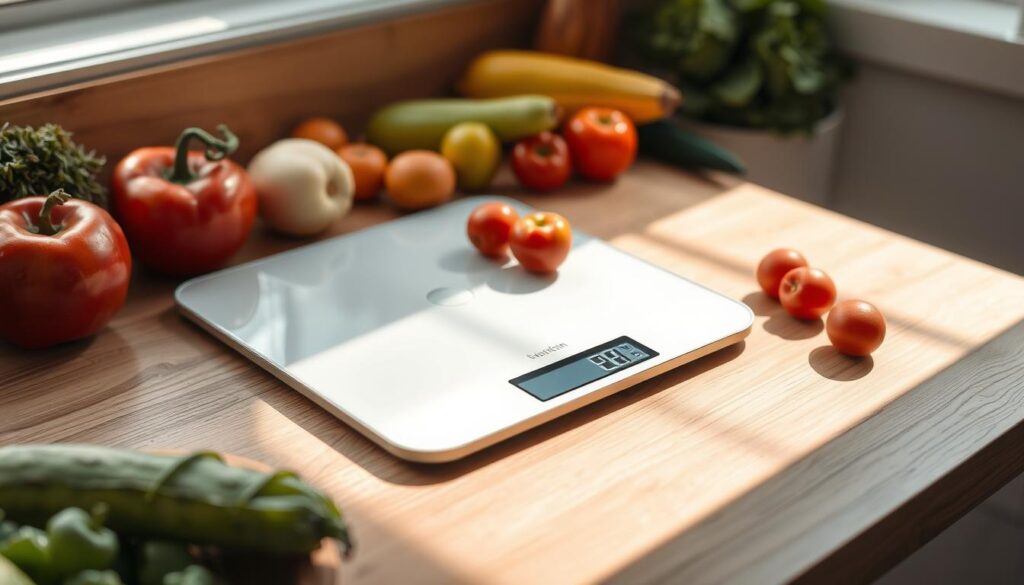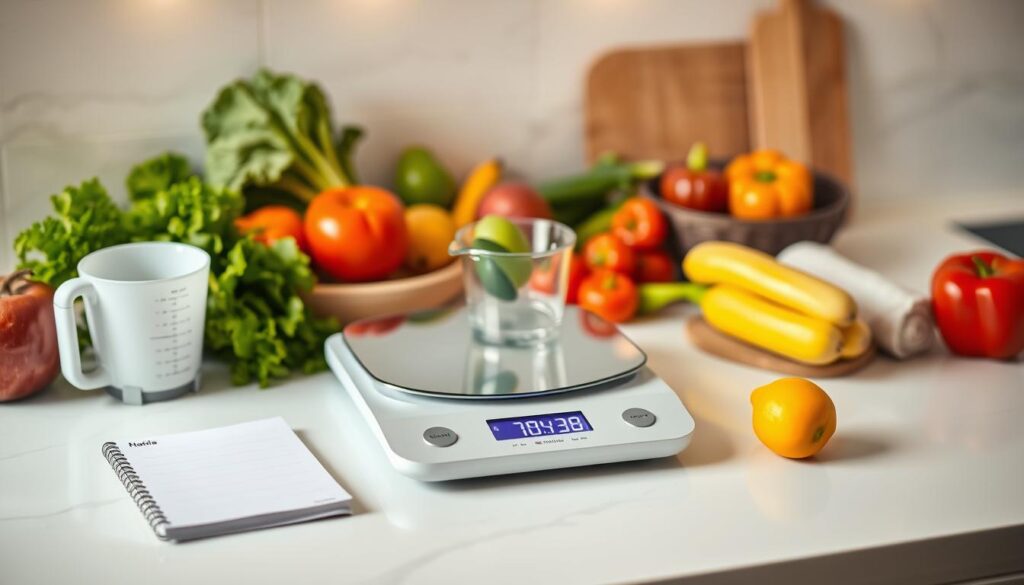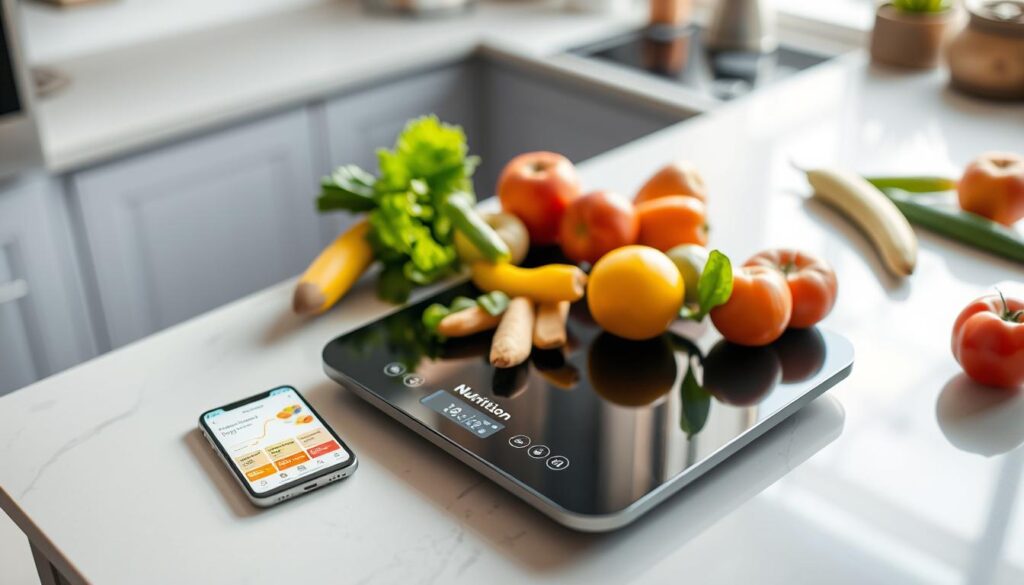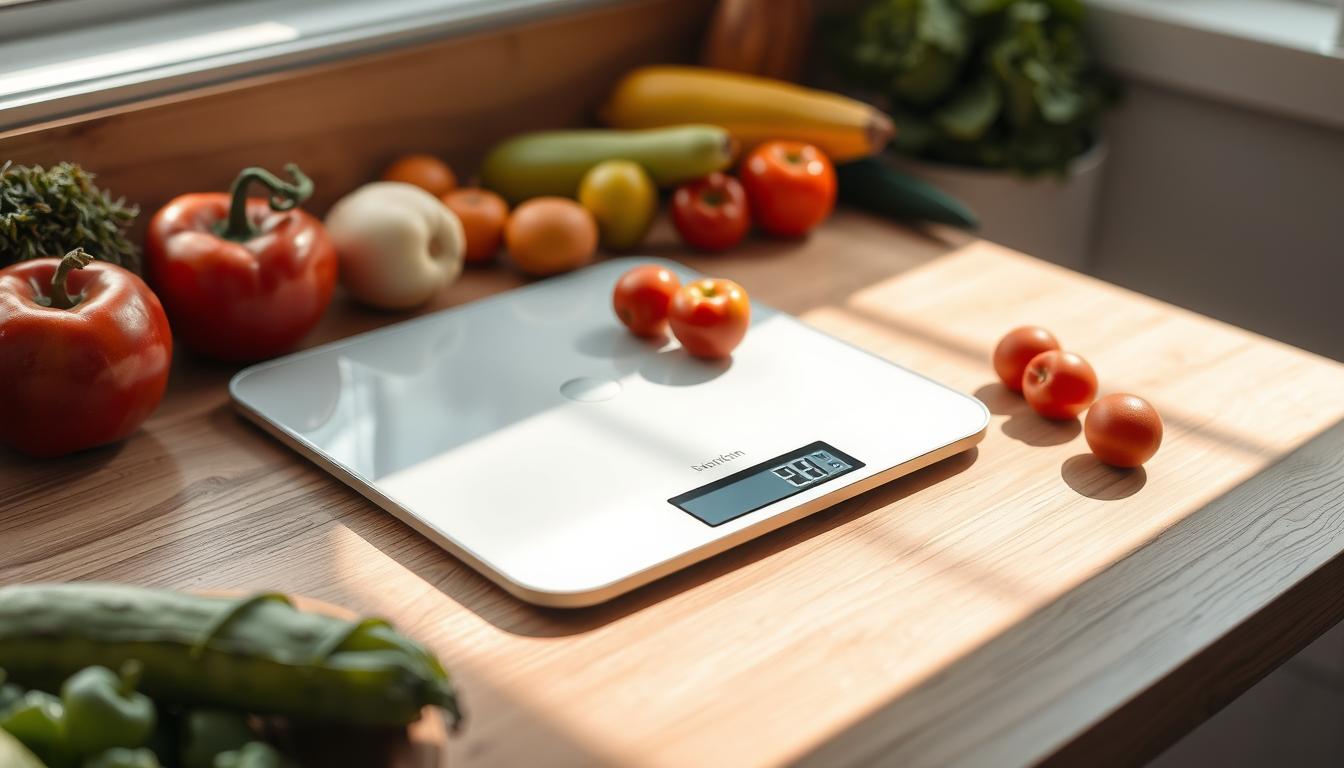Keeping a balanced diet and hitting your nutritional targets requires careful food portion and nutrient tracking. An accurate food scale is key for this, letting you measure ingredients exactly and track your nutrition confidently. This article explains why a reliable food scale is vital for effective nutrition tracking and gives tips on picking the best one for you.

Key Takeaways
- An accurate food scale is essential for precise nutrition tracking and achieving your health goals.
- Eyeballing food portions can lead to significant underestimation or overestimation of caloric and nutrient intake.
- Look for a food scale with high precision, easy-to-read display, and seamless integration with nutrition apps.
- Consistent and proper food scale use is key to maintaining reliable nutrition data.
- Integrating food scale data with a nutrition tracking app can provide a comprehensive picture of your dietary intake.
The Importance of Accurate Portion Control
Controlling your food portions is vital to a healthy diet and reaching your nutrition goals. Measuring food accurately is essential to track calories, macronutrients, and micronutrients. These are crucial for managing weight, building muscle, or dealing with health issues. Guessing food amounts can lead to eating too much or too little of essential nutrients.
Why Precision Matters for Nutrition Goals
An accurate food scale removes the guesswork. It lets you know exactly how much you’re eating, allowing you to make smart food choices. This is especially vital for people with health concerns or those on strict diets.
Common Pitfalls of Eyeballing Food Portions
- Thinking you’re eating less can lead to overeating and gaining weight.
- Not eating enough can make it hard to reach your nutrition goals.
- Changing portion sizes makes tracking your diet and making needed changes hard.
Using a food scale helps you avoid these problems. It ensures you meet your portion control and nutrition information goals, which leads to better health and wellness success.
Food Scale to Track Nutrition: A Game-Changer
A high-quality food scale is essential for anyone serious about tracking their nutrition. It gives precise measurements of food portions, making it easier to monitor progress and adjust diet as needed.
Using a food scale for nutrition tracking has many benefits. It lets you measure ingredients and portions accurately. This way, you can understand the nutrition facts of your meals better. It helps you make informed choices about what you eat.
“A food scale is an essential tool for anyone serious about their health and fitness. It takes the guesswork out of portion control and allows you to track your nutrition with precision.”
For those on specialized diets, like low-carb or vegan, a food scale is crucial. It helps them keep track of their nutrient intake. It’s also vital for managing health conditions like diabetes or heart disease.
Whether you’re trying to lose weight, build muscle, or just improve your health, a reliable food scale is key. It gives you precise measurements and insights into your meals, helping you make better choices and stay on track with your goals.
Key Features to Look for in a Nutrition Food Scale
Choosing the right food scale is key for tracking your nutrition. Look for features that ensure accurate measurements. These details help you monitor your diet and reach your health goals.
Precise Measurements and Increments
Find a scale that measures in grams or ounces with small increments. This precision is vital for tracking nutrients and understanding your diet.
- Precise measurements in grams or ounces
- Small increments, such as 0.1 gram or 0.05 ounce, for detailed tracking
- Ability to measure a wide range of portion sizes, from small servings to larger quantities
Having a food scale with precise measurements is crucial for nutrition tracking. A reliable scale helps you make better dietary choices. It ensures your data is accurate and insightful.
Importance for Nutrition Tracking
Precision Enables recording small changes in portion sizes is essential for detailed nutrient analysis.
Measurement Increments Finer increments (e.g., 0.1 gram) allow for more accurate tracking of food intake
Wide Measurement Range Allows for weighing a variety of portion sizes, from small snacks to larger meals.
“The key to accurate nutrition tracking is a food scale that provides precise measurements down to the smallest increment. This level of detail is essential for understanding your dietary intake and making informed decisions about your health.”
Top-Rated Food Scales for Nutrition Tracking
Getting accurate nutrition tracking starts with the right tools. The best food scales for tracking your diet are known for their precision and ease of use. They also perform well over time.
The Etekcity Food Scale is a top pick. It measures from 0.1 oz to 11 lbs, perfect for small portions. Its design is sleek and compact, great for the kitchen or on the move.
| Food Scale | Measurement Increments | Max Capacity | Special Features |
| Etekcity Food Scale | 0.1 oz to 11 lbs | 11 lbs | Multifunctional, compact design |
| TOBOX Digital Food Scale | 0.05 oz to 13 lbs | 13 lbs13 lbs | Stainless steel platform, tare function |
| Greater Goods Nourish Food Scale | 0.1 oz to 11 lbs | 11 lbs | Sleek design, multiple measurement units |
If you want a best food scale that looks modern, try the Greater Goods Nourish Food Scale. It measures from 0.1 oz to 11 lbs and has many unit options. This scale gives you the nutrition facts you need for your health and fitness goals.

Choosing a top-rated food scale is a smart move for nutrition tracking. It helps you control portions accurately. This way, you can make better choices about your diet and nutrition.
How to Use a Food Scale for Accurate Tracking
Adding a food scale to your nutrition tracking is easy. Just follow these steps to get accurate measurements. This way, you can track your food portions and nutritional intake well.
Step-by-Step Guide to Weighing Food Portions
- Place your food scale on a flat, stable surface.
- Make sure the scale is on and set to grams or ounces.
- Put an empty container or plate on the scale and press “tare” or “zero” to reset it to 0.
- Add the food item you want to weigh carefully, without overloading the scale.
- Write down the weight shown on the scale, noting the food and portion size.
- Do this for each food item in your meal or snack.
By always weighing food with a good food scale, you can track your nutrition well. This helps you make choices that support your health and fitness goals.
“Consistent and accurate food weighing is the key to successful nutrition tracking.”
Using a food scale regularly takes practice. But, the benefits of precise portion control and reliable nutrition data are worth it.
Integrating Food Scale Data with Nutrition Apps
Tracking your nutrition is now easier than ever. This is thanks to the connection between fitness and nutrition apps and your food scale. By linking your scale to these apps, you can automatically log your food and nutrients. This makes it simpler to monitor your diet and reach your health goals.
Apps like MyFitnessPal, Cronometer, and Lose It can connect with your food scale. This lets you weigh your food and have the app log it instantly. It saves time and ensures your nutrition tracking is accurate. Guessing portion sizes can often lead to wrong calorie and nutrient counts.
- Seamless integration between food scales and nutrition apps for effortless tracking
- Automatic logging of food portions and nutrients, reducing manual data entry
- Improved accuracy in monitoring your dietary intake and progress towards your goals
Using a food scale with nutrition apps gives you a better view of your eating habits. It helps you make informed choices to support your health and fitness goals. This powerful tool is a game-changer for anyone serious about their nutrition.

“Integrating my food scale data with my nutrition app has been a total game-changer. It’s so easy to track my meals and see the exact nutrient breakdown, which has helped me hit my goals without the guesswork.”
– Sarah, fitness enthusiast
Tips for Consistent and Reliable Food Weighing
Accurate nutrition tracking depends on consistent and reliable food weighing. To make sure your food scale measurements are accurate, follow these tips:
- Properly Calibrate Your Scale: Regularly calibrate your food scale as the manufacturer suggests. This keeps it precise and reduces errors. You’ll get accurate readings every time.
- Use the Same Units of Measurement: Always use the same unit, like grams or ounces, when weighing food. Changing units can cause confusion and mistakes in tracking.
- Account for Container Weight: Subtract the weight of containers, plates, and utensils from your food weight. This gives you the exact weight of the food, not the total on the scale.
- Develop a Consistent Routine: Create a routine for weighing food, like before meals or at the same time daily. A consistent routine ensures your nutrition data is reliable and accurate.
By following these tips, you can trust your nutrition tracking data. It will help you reach your health and wellness goals.
| Tip | Benefit |
| Properly Calibrate Your Scale | Minimizes measurement errors and ensures accurate readings |
| Use the Same Units of Measurement | Prevents confusion and inaccuracies in nutrition tracking |
| Account for Container Weight | Provides a more accurate measurement of the food itself |
| Develop a Consistent Routine | Ensures reliable and actionable nutrition tracking data over time |
Conclusion
An accurate food scale is key for tracking nutrition and reaching your diet goals. It helps you measure food portions precisely. This way, you can keep track of what you eat and make better choices for your health.
Whether you want to lose weight, gain muscle, or just eat better, a good food scale helps a lot. It lets you see exactly how much you’re eating. This knowledge helps you make smarter food choices.
Using a food scale with your nutrition tracking can really help you achieve your health goals. It’s better than guessing. With the right tools, you can take charge of your nutrition and move closer to your wellness dreams.
FAQ
Why is an accurate food scale important for nutrition tracking?
An accurate food scale is key for tracking nutrition because it lets you measure food exactly. This is vital for keeping track of calories, macronutrients, and micronutrients. Guessing food amounts can lead to big mistakes, causing you to eat too much or too little of important nutrients.
What key features should I look for in a nutrition food scale?
When picking a food scale, look for precise measurements and small increments. These are usually in grams or ounces. This detail is important for tracking your diet accurately.
How can I use a food scale to integrate with nutrition apps?
Many nutrition and fitness apps let you link your food scale. This makes tracking your diet easier. By linking your scale, you can log your food and nutrients automatically, saving time and effort.
What tips can I follow for consistent and reliable food weighing?
For accurate food scale measurements, follow a few steps. Calibrate your scale, use the same units, and remember to account for container weight. These habits will help you trust your nutrition tracking data.
How can a food scale help me achieve my nutrition goals?
A good food scale is a must-have for anyone serious about nutrition. It gives you precise food portion measurements. This helps you track nutrients accurately, making it easier to see your progress and adjust your diet. It’s especially helpful for those on special diets, managing health issues, or aiming for better nutrition and wellness.
